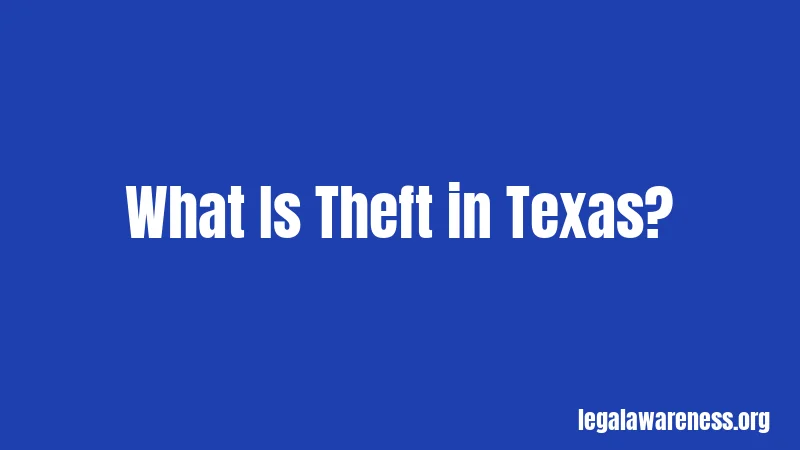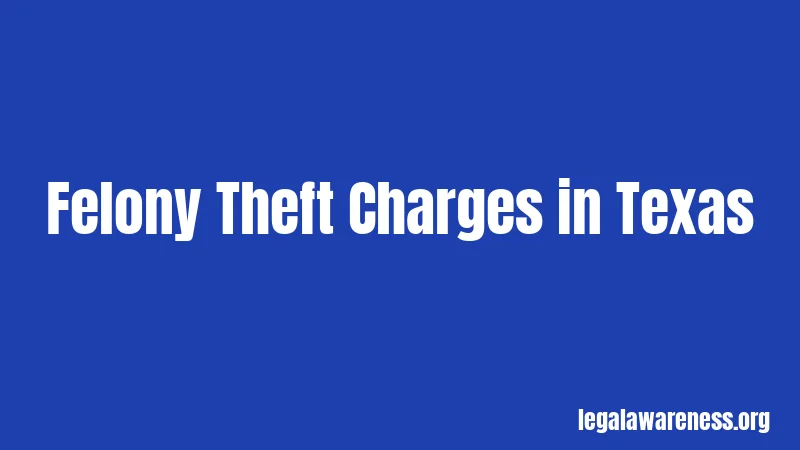Theft Laws in Texas (2026): What Really Gets You Arrested
Most people have no idea how many ways you can break Texas theft laws. Seriously, it’s broader than you might think. The state takes theft seriously, and the penalties can destroy your life. Let’s break down exactly what counts as theft and what happens if you get caught.
Texas doesn’t mess around when it comes to stealing. You’re not alone if this confuses you. Most people don’t realize how strict these laws actually are until something goes wrong.
What Is Theft in Texas?

Okay, here’s the important part. Theft in Texas means taking someone else’s property on purpose. You do this without permission and with the intent to keep it from them. That’s the basic definition, but Texas law goes way beyond just shoplifting.
Think of it this way. It’s not just physical stealing from a store. You can commit theft by taking services, using someone’s utilities without paying, or even shoplifting by hiding items. The law covers a lot more ground than most people realize.
Here’s what counts as theft in Texas. It includes stealing tangible property (actual items). It also covers stealing services. You can even steal someone’s labor or effort. The state’s definition is super broad on purpose.
Basic Theft Crimes in Texas
The Different Levels of Theft
Texas doesn’t have just one “theft” charge. Instead, the state categorizes theft by the value of what you stole. The higher the value, the worse your charges get. This is important to understand because your punishment changes drastically based on the amount.
Let me break down each level. Items under $100 in value count as the most minor theft charge. This is still a crime, but the penalties are lighter. Next, you have theft between $100 and $750. Then $750 to $2,500. After that, $2,500 to $30,000. Then $30,000 to $150,000. Finally, anything over $150,000 gets you the most serious charges.
Sound complicated? It’s actually straightforward once you understand the categories.
Class B Misdemeanor Theft (Under $100)
This is the smallest theft amount you can steal. Less than $100 means you’re looking at a Class B misdemeanor charge. You could face up to 180 days in jail. You might get fined up to $2,000. Sometimes judges give you just a fine instead of jail time.
Does this sound serious? It is, even at this level. A theft conviction shows up on your record forever. This can hurt your job prospects and housing options for years.
Class A Misdemeanor Theft ($100 to $750)
Now things get more serious. Stealing between $100 and $750 bumps you up to a Class A misdemeanor. You could spend up to one year in county jail. Fines can reach $4,000. Most people don’t realize how much a year away from their family costs them.
This is where theft stops being small-time and starts affecting your entire life. Employers see this on your record. Landlords see it too. Your options shrink immediately.
Felony Theft (Over $750)
Here’s where it gets really bad. Once you cross that $750 line, you’re facing felony charges. Felonies are way more serious than misdemeanors. A felony conviction can affect where you live, work, and what you can do for decades.
The penalties depend on how much you stole. The more you took, the worse it gets. We’ll break down each felony level in the next section.
Felony Theft Charges in Texas

State Jail Felony ($750 to $2,500)
Stealing between $750 and $2,500 is a state jail felony. You could face 180 days to 2 years in a state jail facility. Fines can go up to $10,000. This isn’t county jail. State jail is separate and often tougher.
Wait, it gets worse. A felony conviction means you lose certain rights. You can’t vote in some cases. You can’t own a gun. Your job opportunities shrink dramatically.
Third-Degree Felony ($2,500 to $30,000)
This is where felony theft gets serious. Stealing $2,500 to $30,000 means you’re charged with a third-degree felony. You could get 2 to 10 years in prison. Fines reach up to $10,000. A decade in prison changes everything about your life.
This type of charge is no joke. You need to take it extremely seriously if you’re facing it.
Second-Degree Felony ($30,000 to $150,000)
Stealing $30,000 to $150,000 is a second-degree felony. You’re looking at 2 to 20 years in prison. Fines can reach $10,000. This is long prison time. This is your adult life mostly behind bars.
A friend asked me about this last week. She couldn’t believe how harsh the penalties were. They might surprise you too.
First-Degree Felony (Over $150,000)
This is the most serious theft charge in Texas. Stealing over $150,000 is a first-degree felony. You could get 5 to 99 years in prison. Fines can reach $10,000. You could literally spend the rest of your life in prison for this.
Hold on, this part is important. Texas also considers what you stole. Certain items always bump you up to harsher charges. We need to talk about those next.
Special Circumstances That Change Everything
Theft of Certain Items Gets Harsher Charges
Okay, pause. Read this carefully. Some items have automatic penalties that are stricter than the normal value-based charges. Texas says “no matter the value, these items get worse charges.”
Stealing a vehicle? That’s always at least a third-degree felony. Doesn’t matter if it’s worth $5,000 or $50,000. The law treats vehicle theft extra seriously. Stealing livestock (cattle, horses, sheep) gets similar treatment.
What about firearms? Stealing a gun is automatically a felony. The specific felony level depends on the gun’s value, but it’s never just a misdemeanor.
Stealing copper wire or metal? That’s usually a felony now too. Texas passed laws to crackdown on metal theft. It became a real problem with thieves stealing wires from houses and businesses.
Stealing ID information to commit fraud gets you additional charges. This isn’t just the theft charge. You’re also facing identity theft charges on top of everything else.
Theft by Finding or Receiving Stolen Property
Here’s a scenario that surprises people. You find something valuable. You know it’s not yours. You keep it anyway. That’s theft by finding. Texas says if you find property and you intentionally don’t try to return it, you’ve stolen it.
What about this situation? Your friend gives you something. You know your friend stole it. You take it anyway and keep it. That’s receiving stolen property. You’re criminally responsible even though you didn’t steal it originally.
These charges hurt because they’re actually easier to prove. The prosecutor doesn’t have to show you stole the item. They just have to prove you knowingly kept property that wasn’t yours.
Organized Retail Theft (Multi-Store Rings)
This law gets serious fast. If you’re part of a group that steals from multiple stores, you’re facing extra charges. Organized retail theft is a bigger deal than a one-time shoplifting incident.
Texas passed this law because retail theft was becoming an organized operation. Groups of people would steal specific items. They’d sell them online or to pawn shops. The state decided to crack down hard on these organized rings.
Being part of a theft ring means harsher penalties than acting alone. The law sees organized theft as more dangerous to the community.
What About Shoplifting?

Wondering if this applies to you? Shoplifting is theft. It’s not a separate crime. When you take items from a store without paying, that’s theft. The store value of those items determines your charge level.
Here’s the key thing. Many stores have security cameras now. You might think you got away with it. Security staff might approach you. They might let you go. Don’t assume that means you’re off the hook. Stores can press charges days, weeks, or even months later.
Honestly, this is the part most people miss. You think the store is cool with it because they didn’t arrest you immediately. That’s not how it works. They’re often gathering evidence. They’re waiting for the perfect moment to press charges.
Many stores also have loss prevention employees. These people watch for shoplifting. They build cases. Then they contact police. Your casual theft might end with police at your door three weeks later.
Penalties and Consequences
Jail and Prison Time
Let’s be direct about this. Theft convictions mean jail or prison time, depending on the level. Even the smallest theft charge might put you in jail for months. Felony convictions put you away for years.
Your family suffers too. You miss birthdays. You miss your kids growing up. You miss jobs. You miss relationships. The ripple effect of a theft conviction is massive.
Fines and Restitution
You’ll pay money to the court. You’ll also pay restitution to the victim. Restitution means you reimburse the person for what you stole plus their losses.
Say you stole a phone worth $800. The victim had to buy a new one while waiting for yours back. You might owe them $1,600. Sometimes victims also claim lost wages or emotional distress. Fines and restitution can total thousands of dollars.
Criminal Record and Employment
Here’s where a theft conviction really hurts. It shows up on background checks forever. Many employers won’t hire you with a theft conviction. Think about that. Your job options shrink dramatically.
Honestly, this is often worse than the jail time. You get out of prison after a few years. But the record follows you forever. Some people never fully recover professionally after a theft conviction.
Housing and Other Problems
Landlords run background checks. Many won’t rent to someone with a theft conviction. Housing becomes harder to find. Some apartment buildings have strict policies against anyone with theft crimes.
You also lose certain rights. You can’t own firearms with felony convictions. You can’t vote in some cases. Your driver’s license might get suspended. Your professional licenses might get revoked. The consequences stack up fast.
How to Report Theft
If You’re the Victim
If someone stole from you, contact the police. Make a report. Gather all details about what happened. Provide descriptions if possible. Take photos of any damage. Get your case number from the police.
Then call your insurance company if you have theft coverage. You might get compensation for your loss. Keep all documentation of the theft and your losses.
If You Witnessed a Theft
You can report it to the police or store management. Give them as much detail as possible. The more information, the better police can investigate.
If this happens at a store, talk to a manager. Describe what you saw. Get their names and contact information. This helps them identify patterns if it’s a repeat thief.
Recently Updated Texas Theft Laws
Texas made changes to its theft laws in recent years. The state raised the threshold for felony theft charges. Used to be that stealing over $500 was a felony. Now it’s $750. This was meant to help people avoid felony convictions for smaller thefts.
However, Texas also cracked down on organized retail theft. The state added harsher penalties for theft rings. They also increased penalties for certain types of theft like vehicle or firearm theft.
In 2023, Texas lawmakers discussed raising the felony threshold even higher. Some wanted $1,500 to be the new line. These discussions are ongoing. The law might change again before 2027.
Stay informed about changes. Laws shift. What’s legal today might be illegal tomorrow, or vice versa.
Special Circumstances Where It Gets Worse
Theft Involving Violence or Threats
If you steal something and use a weapon or threat, that’s robbery, not theft. Robbery charges are even more serious than felony theft. You could face 5 to 99 years in prison depending on circumstances.
Robbery is essentially theft plus the threat or use of force. The weapon (real or perceived) makes it way more serious.
Theft from Family Members
Stealing from a family member gets you charged just like any other theft. Don’t assume family law is different. You face the same criminal penalties. Family relationships might affect sentencing, but the charges are the same.
Theft as a Repeat Offender
If you’ve been convicted of theft before, your charges get worse. A second theft conviction might mean longer prison time. Multiple convictions can lead to habitual offender status. That really increases your punishment.
Texas has habitual offender laws. If you keep committing crimes, the state treats you as a career criminal. Sentences get much harsher.
How to Comply and Avoid Theft Charges
The Simple Answer
Don’t take things that aren’t yours. Return items that don’t belong to you. Pay for what you buy. That’s literally it.
Okay, that sounds too simple. But it really is. Every single theft conviction comes down to someone taking property without paying for it or without permission.
If You’re Struggling
If you need help, there are resources. Food banks exist in most communities. Churches provide assistance. Government programs help people in crisis. Contact your local social services office.
Many cities have emergency assistance programs. They help with rent, utilities, and food. These resources exist specifically to prevent people from turning to theft.
If You Made a Mistake
If you stole something and want to make it right, talk to a lawyer first. Don’t confess to police without legal representation. A lawyer can help you negotiate with the store or owner. Sometimes people can avoid charges if they make restitution quickly.
Frequently Asked Questions
What’s the difference between theft and burglary in Texas? Theft is taking property. Burglary is entering a building illegally with intent to commit theft or another crime. Burglary charges are usually more serious than theft alone because you’re also breaking and entering.
Can I go to jail for stealing something worth less than $50? Yes, absolutely. Even tiny thefts are crimes. You face jail time even for stealing a candy bar. The amount is smaller, but jail time is still possible.
What counts as “intent to keep” the stolen property? If you take something without permission and keep it, that’s intent. You don’t have to say out loud that you’re keeping it. Your actions show intent. Keeping the item shows you intended to keep it permanently.
Do I have to pay restitution if I get probation instead of jail time? Most likely, yes. Courts usually require restitution regardless of whether you serve jail time. You’ll probably also pay fines. You might serve probation where a probation officer checks on you regularly.
Can a theft charge get expunged from my record in Texas? It depends on what happens. If charges get dismissed, you can request an expungement. If you’re convicted, expungement is much harder. You’d need to wait many years and meet specific requirements. Consult a lawyer about your specific situation.
What if someone falsely accuses me of theft? Contact a lawyer immediately. Don’t talk to police without one. False accusations happen. A lawyer protects your rights while the investigation happens. They can help gather evidence proving your innocence.
Is it theft if I borrow something and never return it? Depends on permission. If the owner let you borrow it, it’s not theft initially. But if you intentionally don’t return it and keep it permanently, that might become theft. The key is your intent. Did you plan to keep it when you “borrowed” it?
What’s the statute of limitations on theft charges in Texas? It varies by offense level. Misdemeanors usually have a 2-year limit. Felonies might have longer periods, sometimes up to 10 years. The clock starts when the theft is discovered, not when it happened.
Final Thoughts
Now you know the basics about Texas theft laws. They’re strict and complicated. The penalties range from small fines to decades in prison depending on what you stole.
Here’s the bottom line. Don’t steal. It’s not worth the consequences. A theft conviction follows you forever. Your job options shrink. Your housing options shrink. Your freedoms get limited. The cost is way too high.
If you’re facing theft charges, get a lawyer immediately. Don’t handle this alone. A good criminal defense attorney understands Texas law. They can fight for you and protect your rights.
Stay informed, stay safe, and when in doubt, look it up or ask a lawyer. Your future depends on making the right choices today.
References
Texas Penal Code Section 31.01 – Theft Definition
Texas Penal Code Section 31.03 – Theft Punishment Framework
Texas Penal Code Section 31.05 – Shoplifting Laws
State Bar of Texas – Criminal Defense Attorney Referral
